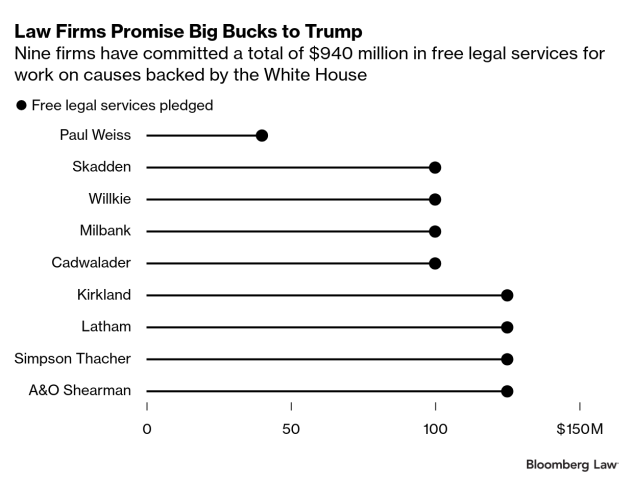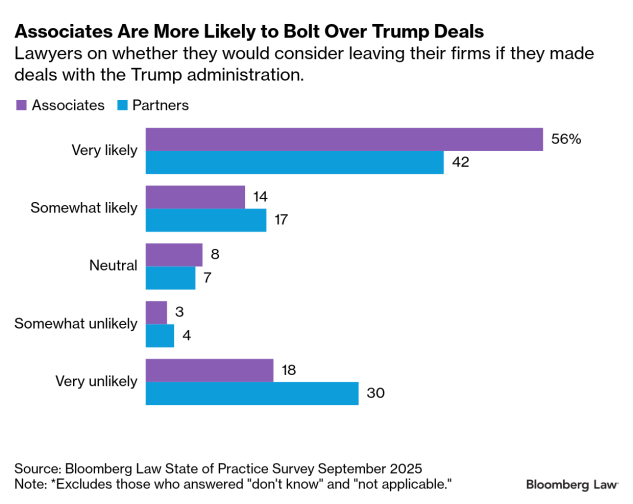Kannon Shanmugam is a rarity among partners at nine big firms that struck deals with President Donald Trump: He’s talking publicly about issues surrounding the agreements.
Shanmugam, the top Supreme Court litigator at Paul Weiss Rifkind Wharton & Garrison, said in response to questions at a law school that while he didn’t want to discuss specifics of his firm, he would express his “personal view” generally about attacks from “both directions” on institutions such as law schools, universities, and courts.
“These attacks are regrettable,” he said at Pepperdine University’s Caruso School of Law in Malibu, California, last month. “If institutions have problems, we should try to fix those problems rather than destroy the institutions.”
The comments, along with those Shanmugam made at a separate event three months earlier, stand out because almost all his peers have declined to speak publicly—even fleetingly—about any of the issues surrounding deals their firms made with Trump in March and April. Among the issues they’ve clammed up about is whether the firms have made any progress in fulfilling their commitments to Trump.
Shanmugam’s comments also stand out because of his heft in the profession—he chairs the Supreme Court practice at a top law firm—and his conservative bona fides. He’s a Federalist Society member and former clerk for the late Supreme Court Justice Antonin Scalia. Shanmugam was mentored by Whitewater investigator Kenneth Starr and worked in the Justice Department during the George W. Bush administration.
He referred glancingly to his industry’s liberal tilt, which other prominent conservatives—including Scalia’s son—railed against long before Trump targeted firms with discrimination probes and punitive executive orders.
“The reality is we don’t see a lot of viewpoint diversity in a lot of the institutions that we’ve been talking about—I think there are negative consequences to that,” Shanmugam told Pepperdine students. “But that’s a problem that can be addressed and it can be addressed in much more modest ways.”
Shanmugam and Paul Weiss declined to comment.
Not the First Time
Shanmugam has spoken out before on Trump’s crackdown on law firms. He was asked at an Aspen Ideas Festival event three months after his firm made a deal to explain Paul Weiss’ decision to “cave” to the Trump administration.
The decision wasn’t easy, he said at the event in Colorado. Trump’s executive orders against firms, which threatened federal contracts of firm clients and barred lawyers from entering buildings, “raise real issues concerning the rule of law and our legal system,” he said.
“On the other hand, for the law firms that are on the receiving end of this, there are very practical considerations concerning the implications for the law firms’ clients, and those implications were very real,” Shanmugam said. “I can tell you that when we were in the vortex of trying to figure out how to respond to this executive order, we all felt the competing imperatives there.”
He said he understands why some lawyers wanted to fight Trump’s punitive actions. But there are “practical considerations” that pulled firms such as his in another direction.
“Your obligations are first and foremost to your clients and, second, to your employees, the people who work for your firm,” Shanmugam said. “We obviously came out the way we did; other law firms have come out differently. I’d be the last person to be critical of those who weigh those considerations differently. I think these are very hard decisions.”
His comments demonstrate how carefully law firm partners are picking their words when it comes to Trump’s attacks. Lawyers want to defend their firms’ ability to take on any client while maintaining favorable relations with the current administration.
“His comments are very measured,” said David McGowan, a professor at the University of San Diego School of Law, who has criticized firms’ deals with Trump. “That is appropriate for a partner at the firm. He’s a brilliant advocate and it’s a tough position to defend so it doesn’t surprise me to see his public comments being measured.”
Paul Weiss
Shanmugam joined Paul Weiss, known for its close ties to Democratic politics, in 2019 from Williams & Connolly to launch a Supreme Court practice at his new firm.
The move marked a rare partner departure for Williams & Connolly, an elite litigation firm known for brawling with the Justice Department in defense of political and corporate clients. It also was a coup for Paul Weiss, a century-old Manhattan firm built on litigation prowess that more recently has become a top player in the lucrative world of corporate deals work.
Shanmugam leads the firm’s Washington DC office and represents many of its largest clients, such as Exxon Mobil Corp. and Meta Platforms Inc. Harvard Corp., which like Paul Weiss has been a target of Trump attacks, named him this year to its board. He took over for another Paul Weiss litigation partner, Ted Wells.
Paul Weiss was the first of the big firms to strike a deal with the Trump White House. The firm made the agreement in order to escape an executive order it was targeted with because of ties to former Manhattan prosecutor Mark Pomerantz and its work on a lawsuit against right-wing group Proud Boys. Pomerantz had investigated the president for allegedly inflating the value of some of his properties.
As part of its deal, Paul Weiss said it would provide $40 million in free legal services to “fairness in the justice system,” combating antisemitism, and support for veterans. It also pledged to abandon diversity, equity, and inclusion initiatives, according to the White House.
The litigation department Shanmugam helps to oversee saw several departures after the deal. Karen Dunn, an outside adviser to the Kamala Harris and Hillary Clinton presidential campaigns, left with several colleagues to start a trial boutique.
Jeh Johnson, former Homeland Security Secretary under President Barack Obama, retired after 40 years at the firm between government stints as he took over as co-chair of Columbia University’s Board of Trustees. Damian Williams, a former US Attorney for the Southern District of New York, left Paul Weiss for Jenner & Block, stating in the latter firm’s press release that he was excited to join a team that “doesn’t shy away from hard fights.”
Paul Weiss has also made some additions during the same time. The firm rehired Masha Hansford, who returned to Paul Weiss in May after a five-year stretch as assistant to the US solicitor general.
Eight firms followed Paul Weiss in striking deals of their own: Kirkland & Ellis, Skadden, Latham & Watkins, Milbank, Cadwalader, A&O Sherman, Simpson Thacher, and Willkie Farr & Gallagher.
Four firms hit with Trump orders—Perkins Coie, Jenner & Block, Susman Godfrey, and WilmerHale—later obtained permanent injunctions striking them down as unconstitutional. Paul Clement, another leading conservative lawyer who Shanmugam worked under in the US solicitor general’s office, is representing one of the firms. A team of lawyers from Williams & Connolly, Shanmugam’s former professional home, is representing another firm.
The Trump administration is appealing the rulings.
To contact the reporter on this story:
To contact the editors responsible for this story:
Learn more about Bloomberg Law or Log In to keep reading:
See Breaking News in Context
Bloomberg Law provides trusted coverage of current events enhanced with legal analysis.
Already a subscriber?
Log in to keep reading or access research tools and resources.



